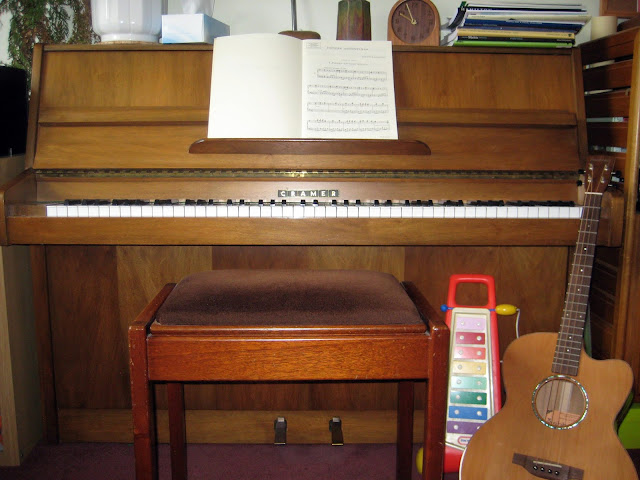Google Analytics
Thursday 9 April 2020
Instruments
How many musical instruments are there in your house?
It came up in conversation a few weeks ago at the orchestra where Mrs D plays bassoon. Some answers were truly astonishing.
Our answer is 29. That surprised us but it is nowhere near as many as some. At the folk band I’m in, one chap, let’s call him Clive, could probably outdo them all. He spends every spare moment attending residential workshops of one kind or another, for ever having just come back from a few days playing Dixie banjo or resonator slide guitar, or making Bodhráns, or something similarly esoteric. He keeps bringing along his latest instrument to show us. You get the impression he could single-handedly equip an attempt on the world record for the largest ceilidh band (at present 288).
To get to our 29, I have counted anything capable of playing a simple melody in tune with other instruments. It is boosted by the kids’ instruments that are still here as they haven’t really left yet. Son takes after mum and did grades in piano and violin. Daughter is more of a dabbler like me but can get a tune out of almost anything.
Piano
Electronic Keyboard
Trombone
Bassoon
Son’s violin
Daughter’s violin
Clarinet (Buffet B12)
Clarinet (Selmer Signet)
Epiphone jumbo acoustic guitar
Teisco Tremo Twenty electric guitar
Ashbury electro-acoustic tenor guitar
Tanglewood electro-acoustic guitar
Nylon stringed acoustic guitar
Mandolin
Soprano ukulele
Baritone ukulele
Single octave ‘toy’ xylophone in D
Chromatic harmonica
Ocarina
Tenor recorder
Alto recorder
6 descant recorders
Penny whistle
Set of ‘toy’ plastic whistles in C
The Cramer upright piano (pictured), from my wife’s childhood, is the oldest, followed by the electric guitar acquired for £10 from a friend of my brother around 1972, but it still plays. The bassoon is next, then my Epiphone acoustic guitar from Kitchen’s music shop in Leeds around 1975. I still have the receipt for the Buffet clarinet for £237.58 dated the 14th March, 1990. Except for some of the recorders, the others are mostly less than twenty years old. The four-string GDAE tenor guitar (also pictured above) is newest, bought this year. I am still too much in denial to admit how much it cost.
We have, between us, also had other harmonicas, bassoons, violins and guitars, including an electric bass lost many years ago during a house move. It seems only yesterday I was pretending to be able to do an A-chord on my first guitar (a metal stringed Sheltone) around 1965. It wasn’t an easy guitar to play, but it strengthened my hands and toughened the ends of my fingers.
Monday 6 April 2020
The Signalman’s Dilemma
A railway signalman spots a runaway truck hurtling down the line, about to crash into an elderly couple who are not paying much attention to anything other than taking photographs of flowers between the tracks (growing there because of lack of maintenance?).
The signalman could divert the runaway truck on to a different track by changing the points. However, there are people on the other track too, a group of five railway workers who (owing to privatisation policies?) have been badly trained and are eating their sandwiches and not keeping proper watch.
Should the signalman switch the points so that the truck will run over the railway workers, or do nothing and watch the elderly couple die?
Now, a different dilemma.
You are the dictator of a country in the grip of a lethal virus. You can minimise the number of deaths by making most people stay at home for months so that they don’t come into contact with each other. This, however, will cause long-term levels of unemployment, poverty, hunger, untreated illness and inequality not seen since the early nineteen thirties, as a result of which an unknown number of people will die.
Alternatively, you can impose fewer restrictions and avoid damaging the economy, but this will result in certain deaths from the virus, possibly including your family, friends and even yourself.
Which would you choose? A difficult decision would have to be made.
The signalman could divert the runaway truck on to a different track by changing the points. However, there are people on the other track too, a group of five railway workers who (owing to privatisation policies?) have been badly trained and are eating their sandwiches and not keeping proper watch.
Should the signalman switch the points so that the truck will run over the railway workers, or do nothing and watch the elderly couple die?
Now, a different dilemma.
You are the dictator of a country in the grip of a lethal virus. You can minimise the number of deaths by making most people stay at home for months so that they don’t come into contact with each other. This, however, will cause long-term levels of unemployment, poverty, hunger, untreated illness and inequality not seen since the early nineteen thirties, as a result of which an unknown number of people will die.
Alternatively, you can impose fewer restrictions and avoid damaging the economy, but this will result in certain deaths from the virus, possibly including your family, friends and even yourself.
Which would you choose? A difficult decision would have to be made.
Subscribe to:
Posts (Atom)


